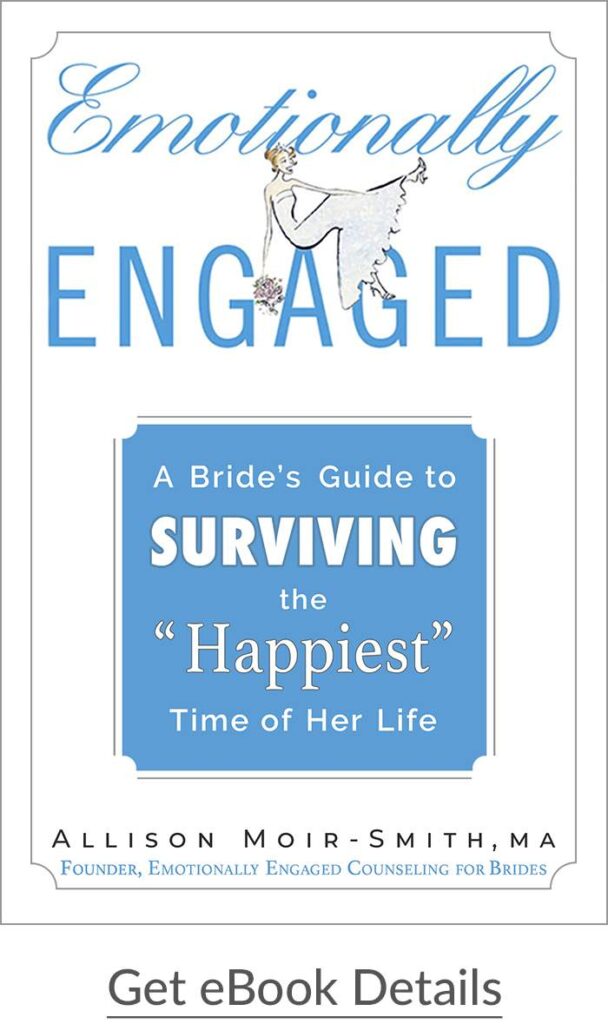Nearly every bride I work with asks me: “Where is all this stress, depression, anxiety and worry coming from?”
“I thought this was going to be the happiest time of my life!
But I’m upset and even sad much of the time.
(I know I want to marry my fiance, so it’s not cold feet.)
What gives?” (Or, more often, “WTF?”)
I’ve worked intimately with brides since 2002, and I’ve identified 5 typical sources.
1. You are planning the most expensive and elaborate party of your life…with 2 Moms
If you and your fiancé were planning your wedding in a vacuum, just the 2 of you, it would be a piece of cake: You know what you like, you work together, you can deal with your budget. But that’s not what’s going on here. Most brides have not one but 2 Moms inserting their strong opinions. So decisions become a delicate diplomatic dance. It’s tedious and exhausting, belaboring every detail.
Solution: You and your fiancé define for yourselves 3 non-negotiables each for your wedding – 3 things each you are unwilling to compromise on. Make sure you get those things, done perfectly, and then be willing to be influenced on the rest. Especially if parents are paying.
2. You leave that “party” — a.k.a. your wedding — a very changed woman.
You go home with a husband with the power to make life-and-death decisions for you, a new branch on your family tree, and (possibly) a new last name. Your wedding is NOT just a party.
Solution: Everything about your wedding feels overwrought and bigger than it should be because, well, it is. For example, the stress you feel when you can’t find the right bridesmaids dress isn’t totally about the design and color of the dress. Psychologically, you’re also working through how you’re going to “fit” all these important women into your new, unknown, married life with you. Be aware of the deeper levels always going on.
3. You’re mourning — yes, mourning.
You’re coming face-to-face with the end of your single life and identity as a single woman; the end of your primary family identity being “daughter”; and the end of the simpler dating days of boyfriend and girlfriend. Each of these endings can cause emotional turmoil as brides process their feelings about these major identity changes.
Solution: Give yourself time and space to just feel. Reflect. Journal. Acknowledge the passing of time, the change in identity, the growing up that is going on. Mourning is background music playing in your mind right now. Let it become foreground music occasionally to work through it.
Bride S.C. from Australia, who worked through her engagement anxiety and engagement depression with me, here on her very happy wedding day.
4. You’re a beginner at marriage.
Guess what? You don’t have a clue how to be married – nor should you! Even if you’ve been married before, you’re still a beginner with this guy. So bring the attitude that “You don’t know what you don’t know” and do some homework, to start you on a good foundation.
Solution: Acknowledge your newbie status, and educate yourselves about what it takes to build a successful marriage. Books I love are John Gottman’s 7 Principles for Making Marriage Work and Tara Parker Pope’s For Better: How the Surprising Science of Happy Couples Can Help Your Marriage Succeed.
5. Your “negative” feelings go unacknowledged by others.
Everybody asks about the wedding — not about you and your inner emotional experience. And that’s isolating, lonely, scary, and can make you feel really angry. You’re strongly getting the message that people can’t handle your complex and conflicting inner life; they’re prefer to talk about your colors and your dress. So you suffer alone. And in your solitude, your normal, garden-variety, and even healthy feelings of sadness get distorted into engagement anxiety and engagement depression.
Solution: Put an end to your isolation. Find a sympathetic, compassionate ear to share and process your true feelings with. Let someone with the wisdom, patience, and insight help you work through your complex — and yet perfectly normal — feelings. Stop suffering through this alone. Let the right person in, and you’ll get a much better understanding of what’s going on for you.



